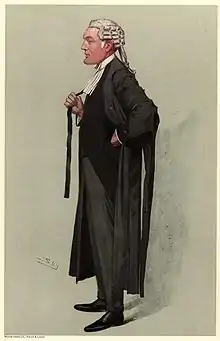John Eldon Bankes
Sir John Eldon Bankes, GCB, PC (17 April 1854 – 31 December 1946) was a Welsh judge of the King's Bench Division of the High Court of Justice, and later the Lord Justice of Appeal.[1]
Sir John Eldon Bankes | |
|---|---|
 Caricature of Sir John Eldon Bankes, published in Vanity Fair, 29 March 1906 | |
| Lord Justice of Appeal | |
| In office 1915–1927 | |
Biography
Born in Northop, Flintshire on 17 April 1854,[2] he was the eldest son of John Scott Bankes (1826-1896) and his first wife, Annie (1829-1876), daughter of Sir John Jervis, himself a chief justice.[2] He was educated at Eton College and Christ Church, Oxford, where he rowed for Oxford University Boat Club.[2]
Called to the Bar in 1878, he took silk in 1901. Whilst on the bench, he was often referred to as J. Eldon Bankes.[3] In 1910 he became a judge of the High Court, and in 1915 a Lord Justice of Appeal and a Privy Councillor. He retired from the bench in 1927.[2]
Bankes was chairman of Quarter Sessions in Flintshire for 33 years, and as a Conservative an active member of Flintshire County Council, of which he was chairman in 1933. He unsuccessfully fought for one of the Flintshire constituencies in 1906. Bankes was on numerous commissions or committees of inquiry, including: Chairman of the Departmental Committee on Education in Rural Wales, 1928; and as a prominent Anglican, with Lord Sankey he drafted the new constitution of the Church in Wales.[2]
On the death of his father, he inherited the family home of Soughton Hall, Flintshire. He married Edith Ethelston in 1882 (d. 1931), and the couple had two sons and two daughters. In 1921, Bankes was made an honorary LL.D. of the University of Wales.[2] The Northop Village Hall was endowed as the Edith Bankes Memorial Institute in her memory.
Bankes died at his home in North Wales on 31 December 1946, aged 92. After his death,[2] the Soughton estate passed to their second son, Robert Wynne Bankes, who served as Private Secretary to successive Lord Chancellors.[1] After the death of his mother, his son, John Wynne Bankes, sold the hall into private hands, and in 1987 it was converted into a country house hotel.[4][5]
Notable judicial decisions
Bankes handed down a number of notable decisions during his judicial career, predominantly in the field of banking law. Key decisions included:
- Tournier v National Provincial and Union Bank of England [1924] 1 KB 461, the leading authority on a banker's duty of confidentiality
- Russian Commercial and Industrial Bank v Comptoir d'Estcompte de Mulhouse [1925] AC 112, on the authority of the bank's officers
- National Provincial Bank v Charnley [1924] 1 KB 431, priority between competing security interests
- Banque Belge pour L'Etranger v Hambrouck [1921] 1 KB 321, on knowing receipt and tracing
- Joachimson v Swiss Bank Corporation [1921] 3 KB 110, on the banker-customer relationship
References
- "Soughton Hall". Flintshire Record Office. Archived from the original on 3 March 2016. Retrieved 17 June 2014.
- "BANKES, Sir JOHN ELDON (1854 - 1946), judge". Dictionary of Welsh Biography. National Library of Wales. Retrieved 17 June 2014.
- "Bankes, Sir John Eldon (1854-1946), judge". Oxford Index. Retrieved 17 June 2014.
- "Soughton Hall". Historic Britain. Retrieved 17 June 2014.
- "Soughton Hall". Parks & Gardens. Retrieved 17 June 2014.